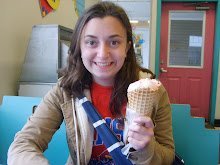Peter Bil'ak
2005
This article is interesting in the fact that it provides different definitions of experimental typography and pushes the reader to decide which form they believe is best. The article states that the best examples of experimental design combine different kinds of experimental methods. It seems that every designer has their own take on experimental design with ideas ranging from 'experimental typography does not exist, nor ever has' to 'every type job is experiment'. Although there are many different methods, the article believes that no matter how you go about it, the end result is no longer an experiment. "As soon as the experiment achieves its final form it can be named, categorized and analyzed according to any conventional system of classification and referencing."
Quotes I liked in the article
"As a verb, ‘to experiment’ is often synonymous with the design process itself, which may not exactly be helpful, considering that all design is a result of the design process. The term experiment can also have the connotation of an implicit disclaimer; it suggests not taking responsibility for the result."
"A scientific approach to experimentation, however, seems to be valid only in a situation where empirical knowledge is applicable, or in a situation where the outcome of the experiment can be reliably measured. What happens however when the outcome is ambiguous, non-objective, not based on pure reason?"
"This is directly opposed to the scientific usage of the word, where an experiment is designed to add to the accumulation of knowledge; in design, where results are measured subjectively, there is a tendency to go against the generally accepted base of knowledge."
"In science a single person can make valuable experiments, but a design experiment that is rooted in anti-conventionalism can only exist against the background of other — conventional — solutions. In this sense, it would be impossible to experiment if one were the only designer on earth, because there would be no standard for the experiment."
"As the profession develops and more people practice this subtle art, we continually redefine the purpose of experimentation and become aware of its moving boundaries."

No comments:
Post a Comment